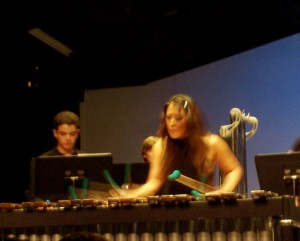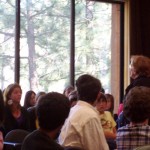
This quintet, which included a 14-year-old prodigy, played Shuber's "The Trout"
By Marcia E. Gawecki
The Student Chamberfest Recital on Wednesday evening, August 18, showcased five soloists and five chamber acts in a relaxed, indoor/outdoor setting at Stephens Recital Hall. Most of the audience members were faculty, staff and friends who had just celebrated the final potluck of the summer. The mood was happy, relaxed, and the students didn’t disappoint them. There were some surprises that included a 14-year-old prodigy and several broken drum heads.
First up was a trombone quartet that played “Achieved in the Glorious Work,” by F.J. Haydn. The group, which included Karl, Allison Jason and Micah, started immediately, and played without pretense.
“That was well done,” exclaimed Andrew Leeson, a writing teacher at Idyllwild Arts Academy, who attended many of the concerts this summer. “A trombone is not an exact instrument and they hit every note.”
 The next student playing a solo was Kevin, on French horn. He was accompanied by Edith Orloff, a faculty piano teacher. Kevin stood the entire time and played “Concerto in E-flat Major, K 495,” by Mozart. If you were to close your eyes, his horn sounded like a trombone at times. Afterwards, many people in the audience got to their feet, which surprised the young man.
The next student playing a solo was Kevin, on French horn. He was accompanied by Edith Orloff, a faculty piano teacher. Kevin stood the entire time and played “Concerto in E-flat Major, K 495,” by Mozart. If you were to close your eyes, his horn sounded like a trombone at times. Afterwards, many people in the audience got to their feet, which surprised the young man.
The next soloist was actually a duo playing “Toccata,” by Koppel. It included Lindsey on vibraphone and Lauren on marimba.
“That girl’s really good,” exclaimed Andrew, of Lindsey afterwards. “She could go pro now.”
The two played a duet with double mallets that were moving so fast that they always turned up blurry on camera. The incredible thing is that each of them were hitting four different keys with those mallets at the same time.

(at L) Lindsey and Lauren (R) played Koppel's "Toccata" at a fast pace on vibraphone and marimba
“They’re not necessarily different notes,” said Andrew. “It’s just like fingers on a piano keyboard.”
Yet, the precision, speed and acccuracy of the piece was remarkable. The piece was lively, strong and uptempo, and then it suddenly went soft and smooth.
Next up was Alek on bassoon with Edith Orloff accompanying him. Alek played, “Scherzo in G Minor,” by Miroshnikow.
Rarely do you get a chance to see a bassoonist play up close. Usually they’re cloistered in the back of an orchestra, and one just marvels at the slender size of the instrument. Yet, the mouthpiece is rather ornate with a swan’s neck, and the player has to blow and suck on the reed to make the perfect sound. The effect is not glamourous, with a lot of puffing of the cheeks, but fascinating nonetheless.
“That reed of his is shot now,” Andrew said. “Most bassoonists make their own reeds, and throw them out after each performance.”
The final soloist, Anna Sigmund, a German student on violin, was impressive because of the high notes that she hit in her selection, “Conncerto in E Minor, Op. 64,” by Mendelssohn. Anna stood tall and proud in a black dress and ankle bracelet. But all eyes were on her violin when she commanded the high notes in this moody, intense, and rather long piece.

Anna, a German violinist, commanded the high notes in the Mendelssohn piece
“It’s all in the bow,” Andrew said afterwards. “She didn’t back off from the high notes, like many others would have. In time, she’ll own that piece.”
The first chamber group of the evening included two violins, a viola and a cello. They played, “String Quartet in C Major, K 465,” by Mozart.
The lead violin, Michal, a high school student from Poland, had gone on a Sunday trip to Venice Beach a couple of weeks earlier. He took a lot of pictures of the California scenery, and marveled at the six-lanes on Hwy. 10.
“We don’t have this many lanes on highways in Poland,” he said, taking pictures of the cars and trucks. “But everyone is going very slow. Can’t you go any faster?”
Said like a true impatient teenager.
Along with Zoe, Michael and Tiffany, he played the lively, upbeat Mozart piece with enthusiasm.
The next group played the Shubert favorite, “The Trout,” or “Quintet in A Major, Op. 114.” It included a piano, bass, cello, viola and a 14-year-old violin player from Germany. He sat in the first chair during the first concert of the season.
“He started young, but that doesn’t mean anything,” said Christophe Wyneken, a violin and viola teacher from Germany, who brought him to the Idyllwild Arts Summer Program. “He’s got ability.”

(from L) Michal, a violinist from Poland, played the Mozart piece with authority
Michal agreed. “Leo’s good.”
In this quartet, Leo played like a master. The other players, including Alex, Anna, Dana and Noah, kept looking at him to lead the piece. However, Noah, on piano, held his own, and didn’t get drowned out.
“You’re going to enjoy the flute player in this next piece,” said Andrew, who had heard him perform before.
Dressed in jeans, white shirts and tennis shoes, this group, made up of Kevin on flute, Ross on oboe, Louis on clarinet, Carl on Bassoon and Nick on French horn, looked relaxed for this short piece, “Quintet” by Blumer.
Kevin, who played the flute effortlessly, and sounded like a bird in flight, also was animated, moving about to the music in his seat.
The next group included two violin players, a viola, cello and double bass, that played, “Quintet in G Major, Op. 77” by Dvorak.

(from L) Mimi, a tiny German violinist with a big sound
Tiny and prim, Mimi, the lead violin player, who is also German, had an incredibly loud sound. She didn’t drown out the other players, but I kept looking for a hidden microphone. How did so much sound come out of a tiny girl with a standard violin?
Grecia, who played the double bass, brought in her huge, unwieldly instrument like a pro. Although it was double wide, it sounded like a standard bass. But it was fun to watch because many of us had never seen one before.
Before the final chamber piece, Jonathan, who was teching the show, invited everyone in the audience to come closer to the stage that was set with drum heads, sticks and pillows. Many students sat and laid on the floor in anticipation.

Leo, a 14-year-old violinist from Germany, played with authority
“You’re really going to love this piece,” exclaimed Andrew, who had seen it performed by the Chamberfest Percussion Ensemble the night before.
The modern piece by M. Ford was called, “Head Talk.” As the name suggests, the four drummers only played drum heads, with drumsticks as they sat cross-legged on the ground.
The piece included some antics, including hitting, rolling, tossing and slapping of the drum heads. They were clear and of varying sizes. When Una, a former Idyllwild Arts student, rolled her drum head to Lindsey, who resumed play, it looked spontaneous.
“That was all written into the piece,” said Una and Lauren later.
But their facial expressions and feined impatience with Severin, the only male drummer, was spontaneous, they said.
Severin sat in front with a dramtic blue scarf tied around his neck. During the piece, he’d bang louder than the others, or bounce the drum head off his head, to the mock disgust of the rest of the girls.

In "Head Talk," the drummers rolled, tossed, hit and slapped only drum heads
Yet, it was a perfectly choreographed piece, that ended with each of the players, Una, Lauren, Mika and Severin, all breaking their own heads through their drum heads at the final bow.
“They cost about $20 bucks each, but we replace them all the time,” explained Una, later of the broken drum heads.

For the finale of "Head Talk," the drummers broke them on their own heads
Many of these students will be playing in the High School Chamberfest Concert today at 1 p.m. It will be held in the IAF Theatre in the Bowman Building. This final concert of the summer is free and open to the public.



































